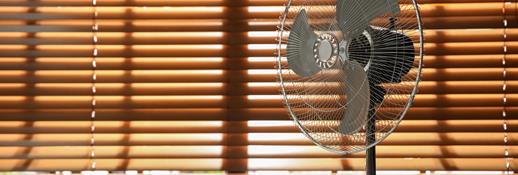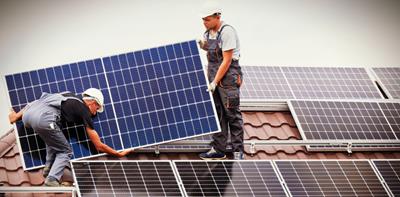
Most of us welcome the hot weather as we reach for our sunglasses, fire up the barbecue or head for the beach. However, record-breaking temperatures of 40°C-plus in recent years have underlined how our homes can sometimes become uncomfortably hot.
Sweltering heat can be a severe health hazard for many people, so knowing how to make your home a sanctuary from the sun is essential. Here, we share some great tips on how to beat the heat at home.
EASY AS HACK
When it’s hot, it’s best NOT to throw open windows during the heat of the day? You should shut windows, blinds and curtains to keep your home cool and comfortable.
At a glance
- Vulnerable groups like the elderly and young children are most at risk from hot temperatures
- From blocking out the sun’s rays and the clever use of fans, to ventilation and air conditioning systems, there are many ways you can keep cool
- Place ice cubes in front of your fan to cool down the air blown in your direction
HOMES MOST LIKELY TO OVERHEAT
The homes most likely to swelter in heatwaves according to gov.uk are:
- top-floor flats, as heat rises
- bedrooms built in loft spaces, which will often be hotter
- homes with no shading from the sun - external shutters or shades, or internally, such as no curtains or blinds
- urban homes in a densely built-up area with access to little green space, which may experience even hotter temperatures
PEOPLE MOST AT RISK OF ILL HEALTH FROM OVERHEATING
Some people will be more vulnerable than others when it comes to getting too hot in their homes, so try to check in on friends and family. Those that are most likely to be affected are:
- older generations, especially those aged 65 years plus
- children age five and under
- anyone with a long-term health condition (particularly heart and breathing problems)
TIPS FOR STAYING COOL
There’s no reason anyone should suffer stifling temperatures indoors, as there are plenty of ways to keep the worst heat at bay. Handy tips in the ‘keep cool at home’ checklist [1] published online at gov.uk include:
- Keep blinds or curtains closed as they are an effective barrier against the sun’s heat – the same applies to external shutters or awnings.
- Open windows on opposite sides of the house to release warm air and allow cooler air in. But only do this when the air temperature outdoors is cooler than inside, which tends to be overnight or for a couple of hours in the early morning. However, avoid leaving ground floor or lower-level windows open as it could invite burglars.
- Put an electric fan before an open window (if it is cooler outside) to encourage fresh air to blow throughout the room. Another trick with a fan is to place ice cubes in front of it to cool down the air blown in your direction.
REMEMBER, it’s best to use electric fans at temperatures below 35°C.[2] Using a fan above that point might make you warmer as you waft yourself with hot air, like a hairdryer. - To reduce heat in your home, turn off lights without low-energy bulbs, and don’t use washing machines, dishwashers or ovens during the hottest parts of the day.
- Cook outside on the barbecue rather than inside.
- Growing plants outside can shade your home, but not too close (to avoid subsidence risks). See more below. Indoor plants may also help keep it cool inside.[11]
- If you have a home ventilation system, check it to ensure it operates properly. According to available figures, air conditioning is still rare in the UK – under 5% of UK homes have it.[3] Portable air conditioning units are a possible option for some as they are less expensive than fitting built-in air conditioning.[4] However, if you have air-conditioning in your home, set the thermostat to between 24 and 27°C or as high as you feel comfortable. It will help to keep your energy costs down.[5]
MORE WAYS TO BEAT THE HEAT
Clever use of extractor fans is another tip for staying cool indoors. When temperatures climb, open your internal doors and leave your bathroom and kitchen fans running to rid your home of some excess heat. If it’s still unbearably close inside, consider using a dehumidifier to draw moisture out of the air and let your skin breathe better.[6]
Large amounts of glazing can turn your home into a greenhouse in fierce sunshine, but applying a solar control window film is an inexpensive and easy way to ensure you and your rooms won’t overheat.[7]
OTHER HOT WEATHER THREATS TO YOUR HOME
- Long sunny spells can dry out the soil around your home’s foundations, potentially causing subsidence.
- Clay-rich soil in southern parts of England is particularly vulnerable. Insurance claims for subsidence did show a significant increase after the UK’s summer heatwave of 2022 when temperatures peaked at 40°C-plus in mid-July.[8]
- Trees and shrubs near your home can increase the risk of subsidence as their roots absorb water, so get expert advice before planting new vegetation – or removing it. Homeowners should also consider the soil-drying effect of laying impermeable drives, paths or hardstanding around their homes.[9]
- The heatwave of 2022 also resulted in London firefighters experiencing their busiest day since the Second World War, with 41 properties in London damaged by fire.[10]
Tips for protecting your home from a fire include:
- Keep electronic equipment, e.g. e-scooters, mobile phones, and items with a lithium battery out of direct sunlight.
- Keep mirrors, crystals, glass ornaments and other reflective items out of direct sunlight.
- Although it’s tempting to plug in multiple fans and all your other electrical appliances, be aware that overloaded plug sockets can start fires.
- Consider buying a fire extinguisher and check your heat and/or smoke detectors are working.
Related article: How to prevent the risk of fire in a heatwave.
Find out more about our Ageas home insurance or visit our Heat hub.
Sources
[2] https://www.nhs.uk/live-well/seasonal-health/heatwave-how-to-cope-in-hot-weather
[4] https://www.homebuilding.co.uk/advice/how-to-keep-a-house-cool
[5] https://www.environment.sa.gov.au/goodliving/posts/2018/01/keeping-house-cool-efficiently
[7] https://www.homebuilding.co.uk/advice/how-to-keep-a-house-cool
[8] https://www.abi.org.uk/news/news-articles/2023/9/home-insurance-payouts-up-11/
[9] https://www.bgs.ac.uk/news/six-ways-to-prepare-your-home-for-climate-change-related-subsidence


